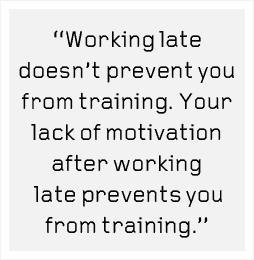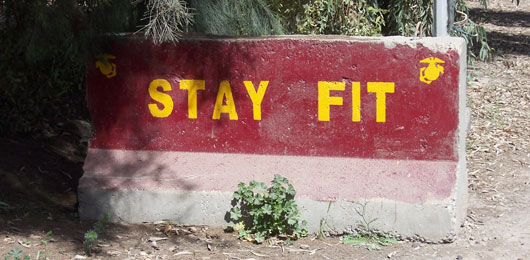Jeff Barnett is a fitness enthusiast from Huntsville, Alabama. For the past ten years he has pursued strength and health in numerous ways including serving as a Marine Corps officer. He posts his daily workouts on his website, CrossFit Impulse.
In part one of this two-part series on fitness I will explore the mental aspects of seeking physical fitness. No matter how trite it may sound, mental attitude is a large part of achieving fitness goals. While genetics is the most obvious constraint to your physical abilities, your attitude determines almost everything else. In order to accomplish your fitness goals you will need to not only understand, but actually believe four key concepts.
Know Why You Train
If you set out to work on your car for the sake of working on your car then you'll rarely accomplish anything. You need a purpose, like changing the oil or replacing a belt. While everyone that exercises thinks he knows the reason, I challenge you to be honest with yourself. Here are some possible reasons to exercise:
- Develop upper body strength.
- Lose weight.
- Develop cardiovascular endurance.
- Look more attractive.
- Be seen exercising.
- Be overall physically fit.
I'm not judging the content or usefulness of each reason, but they are all, indeed reasons to exercise. Your reason also may not be a simple four-word sentence. That's OK–mine's not. The point is that you need to know the real reason. If you don't find the true reason for your training then your training will be without purpose, or at best designed for a purpose that you don't really seek. You can also go further and quantify your reason into measurable goals (e.g. perform 20 dead hang pullups). While measurable goals are indeed
You Determine Your Results
You are in control. You determine how often you train, the intensity at which you train, and exactly how you train. Your success is a direct result of your efforts, and any lack of success is a direct result of your lack of effort. There is no middle ground: You are responsible. Working late doesn't prevent you from training. Your lack of motivation after working late prevents you from training.
However, you decide your priorities, and of course, there are always exceptional circumstances, and I'm not going to tell you to place fitness above any of your other priorities. I am telling you that when you let life's curveballs give you a mental excuse for not achieving your fitness goals you are simply admitting that you're not willing to work hard enough to achieve those goals.
There are plenty of fitness goals that I'm not willing to work hard enough to achieve: running a 5 minute mile, bench pressing 300 pounds, completing a marathon. However, if you never seem to find the time or effort to train then admit to yourself that you are not willing to make the necessary sacrifices to meet your fitness goals. Don't let yourself believe anything else
You are Capable of Achieving Any Fitness Goal
OK…almost any goal. At about 6 feet tall and 173 pounds I won't be winning the World's Strongest Man Competition. However, I can achieve any fitness goal that is realistic for my size. I am only limited by my desire to work towards that goal. The important concept is that you have to shove aside any ideas that you can't achieve what you desire.
It's not just psycho-motivational bullshit. It's truth. Would you like to drop XX pounds? It can be done. Would you like your body to look a certain way? It can be done. The question that has an uncertain answer is this one: Are you willing to do the work necessary to achieve your goal? Of course, some people are limited by health conditions beyond their control. However, this line of reasoning carries a lot more weight with me when it's presented as, “I've come this far in achieving my goal, but I can't seem to break this barrier because of _______.” Most often I see it presented as, “I have _______ so I am not able to _______. There's no reason for me to try.”
Legitimate reasons abound for why some people cannot exercise at the levels they would like, however, the vast majority of us are only limited by our will. Start with training and find your excuses. Don't start with excuses as a way to avoid training. If you commit to the necessary work and apply your efforts correctly then success is the only possible result.
Training for Improvement is Not Easy
Training is difficult by design. If your training is not challenging you mentally and physically then you should question whether it is truly worthwhile. It's supposed to hurt. You're supposed to walk a little funny from time to time. You're supposed to kneel on the floor in exhaustion from time to time. You're supposed to perform tasks that you're not familiar with or good at. If you're in your comfort zone then you're not improving. You may be sustaining, but you're not improving. There's a difference. Know whether you are training to keep what you've got or build what you don't.
If you've chosen to build what you don't currently have then you must accept that it will come at a cost to your comfort. The amount of discomfort you're willing to bear is usually directly proportional to your success. Fortunately, improvement training can be fun, exciting, challenging, rewarding, and a host of other positive terms…but it will never be easy.
In the second part of this series I will explore what you had probably hoped I would address in the previous 800 words: an efficient and worthwhile method of achieving physical fitness. I don't claim to have the answer, but I do claim to have an answer, and I think it's a pretty good one. In ten years of voluntary physical training in various disciplines including anaerobic weight training with supplements, cardiovascular endurance training for running, high-protein/low-fat diets, and the varied requirements of the Marine Corps, I have never been more physically fit than I am right now. I hope you'll return next time to learn from my mistakes and join me in new successes.







![It’s Time to Begin Again: 3 Uncomfortable Frameworks That Will Make Your New Year More Meaningful [Audio Essay + Article]](https://www.primermagazine.com/wp-content/uploads/2025/01/begin_again_feature.jpg)









